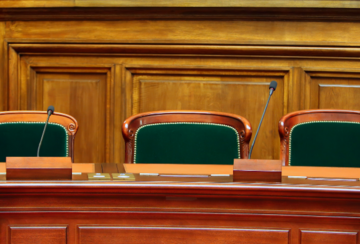Three Stanford scholars have been elected to the British Academy, in recognition of their achievements in the humanities and social sciences.

Marciel, a former senior U.S. diplomat, brings extensive experience in public policy focused on Southeast Asia. His appointment is based at FSI’s Walter H. Shorenstein Asia-Pacific Research Center.

The Korean Wave, which has unique characteristics and continues to evolve in intriguing directions, could become a first mover on the global cultural scene.

Ending the fighting may well require talks, but the decision to negotiate should lie with Kyiv.

Latin American countries will push again for nuclear disarmament at this month’s review conference

During a hearing titled “A Growing Threat: Foreign And Domestic Sources Of Disinformation," DiResta offered expert testimony on influence operations and the spread of narratives across social and media networks.

Dr. Daniel Greene has been accepted as a 2022 Emerging Leaders in Biosecurity fellow from the Center for Health Security at John Hopkins University.

Expanding upon classic deterrence strategies, Center Fellow Oriana Skylar Mastro proposes an underutilized path to deterrence in which Guam — a remote U.S. outpost that has become a strategic hub as tensions with China rise — would remain a crucial logistical waypoint, even in the face of potential Chinese missile attack.

Herb Lin, a disinformation scholar at Stanford, said DHS will need to tread carefully moving forward. He worries “about any government involvement in this business” and whether “any mechanism that you set up can be made tamper proof.”
A look at how user choice and transparency provide new ways of addressing content moderation and online safety policy.
The following reflection is a guest post written by Nathan Chan, an alumnus and honoree of the 2021 Stanford e-China Program, which is accepting student applications until September 1, 2022.

One. More. Time. It’s not about NATO
One. More. Time. It’s not about NATO
Vladimir Putin and the Kremlin had a number of reasons for invading Ukraine in February and starting the largest military conflict in Europe since World War II. Putin sought to portray the pre-invasion crisis that Moscow created with Ukraine as a NATO-Russia dispute, but that framing does not stand up to serious scrutiny.

Center Fellow Oriana Skylar Mastro talks to the Center For Advanced China Research about the risk of Chinese attacks on U.S. military bases in Asia at the outset of a Taiwan conflict, the likelihood of Japanese or NATO involvement in a war over Taiwan, the downsides of focusing on communicating resolve to defend Taiwan, whether the United States is “outgunned” by China, and more.

Three things to know about the not-so-covert cyber-operations between these two adversaries
The U.S. Department of Veterans Affairs awards Keith Humphreys top honors for his research on treatments for substance use and psychiatric disorders.
New work by team including FSE researchers provides a broad, cautionary understanding of why financial incentives alone are unlikely to prevent forest-clearing fires in Indonesia’s oil palm regions.
FSE researcher and other Stanford experts explain extreme heat’s impacts on workplace risks, marginalized communities, and the economy.

For long-term Jakarta and Washington relations, what will matter is not who will attend the 2022 G20 summit in Bali. It will be the names and plans of the Indonesians and Americans who will run and win in the national elections to be held in their respective countries in 2024.
In this Q&A with Stephanie Ashe at Stanford Law, SHP's Michelle Mello — a professor of health policy and a professor of law — examines the guidance for health-care providers recently issued by the Biden Administration.

What Britain’s geography means to the British people is key to understanding why they voted to leave the European Union, Stanford classics Professor Ian Morris asserts.

Interested students must apply by August 12, 2022.

Abe was one of the most transformative political leaders in modern Japanese history, and his passing will change Japanese politics in a number of ways, most immediately shaking up internal politics within the ruling Liberal Democratic Party. To honor Abe’s legacy, we all need to reassert our resolve to protect our democracy in Japan, the United States, and all over the world.

The Program on Arab Reform and Democracy (ARD) at CDDRL is pleased to announce the release of the June 2022 issue of Mofeed Digest, a periodic recap of the most important scholarly and policy publications, reports, and articles investigating the impact of the COVID-19 pandemic on the politics, economies, and societies of the Arab world.

Lyubov Sobol, an activist and current visiting scholar at CDDRL, explains the roots of Russia's pro-democracy movement and the importance of its success to Russia, Ukraine, and the future stability of the global democratic community.

Dr. Sanne Verschuren has been awarded the 2022 Kenneth Waltz Outstanding Dissertation Award from the International Security Section of the American Political Science Association for her dissertation titled "Imagining the Unimaginable: War, Weapons, and Procurement Politics".











